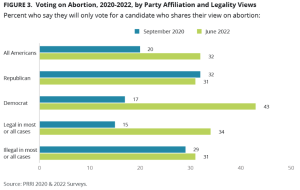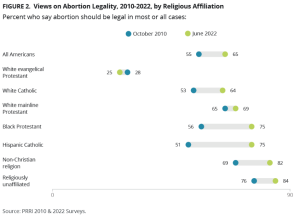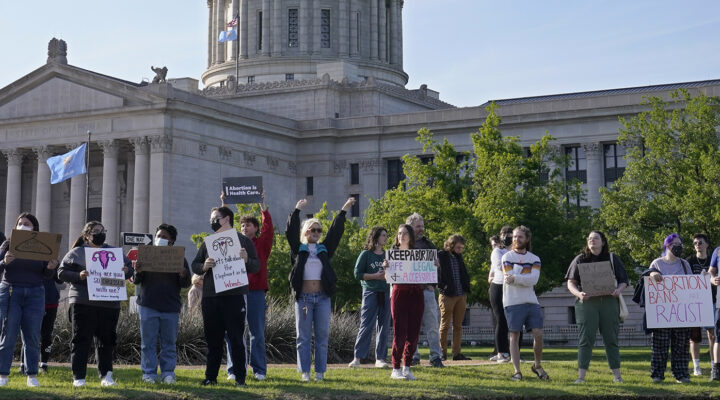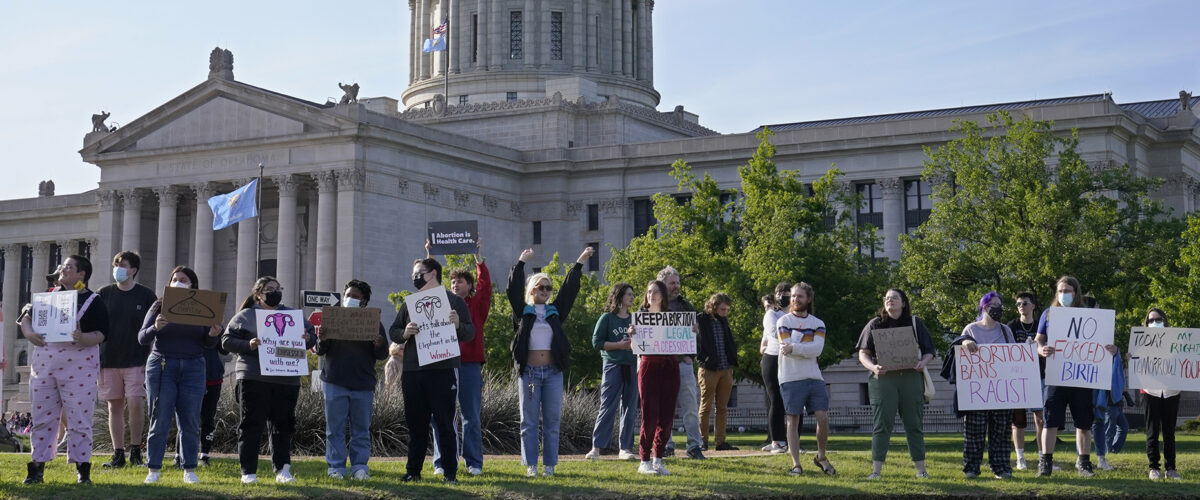Since the U.S. Supreme Court’s June reversal of Roe v. Wade, Democrats are significantly more likely than Republicans to say they will support only those political candidates who share their stance on abortion, according to a recent poll by Public Religion Research Institute.
“More than four in 10 Democrats (43%) now indicate this is a crucial aspect of their vote, compared to only 17% who said the same in the fall of 2020. This is the first time in PRRI polling that Democrats have been more likely than Republicans (31%) to say a candidate must share their view on abortion in order to get their vote,” PRRI said about the research conducted in the days immediately after the June 24 ruling on Dobbs v. Jackson Women’s Health Organization.
Another first in its polling, PRRI said, is that Americans who favor legal abortion are more likely than those who don’t to say they will vote based on that issue, at 34% compared to 31%.

“In 2020, only 15% of those who said abortion should be legal in most or all cases would only vote for a candidate who shared that view, compared to nearly double (29%) among those who think abortion should be illegal in most or all cases,” PRRI noted.
Among religious groups, white evangelical Protestants (31%) remain among the most likely to say they will choose candidates who share their abortions views. “However, they are now joined by 40% of non-Christian religious Americans and 36% of religiously unaffiliated Americans who say the same. The proportions of these latter two groups that say they will only vote for candidates who share their view on abortion have more than doubled since 2020 (18% and 17%, respectively).”
Most other religious groups underwent similar changes, PRRI said. “White Catholics (31% vs. 20% in 2020), white mainline Protestants (27% vs. 17% in 2020), Black Protestants (24% vs. 14% in 2020), and Hispanic Catholics (30% vs. 20% in 2020) have become more likely to say this as well.”
Americans’ preference for candidates who are like-minded on abortion also increased when broken down by racial and ethnic groups, the survey found. “Around one-third of Asian, Native and multiracial Americans (35% vs. 18% in 2020), white Americans (33% vs. 22% in 2020), and Hispanic Americans (32% vs. 21% in 2020) say only those who share their abortion views will earn their vote, and 24% of Black Americans (15% in 2020) say the same.”

White Americans with at least four-year college degrees, at 37%, were more likely than those with less formal educations, at 31%, to say they will support candidates who agree with them on abortion.
“Women (36%) are more likely than men (28%) to say they will only vote for someone who shares their views on abortion, but both increased from 2020 (22% and 18%, respectively). Democratic women (47%) are particularly likely to say this, compared with Republican women (33%) and independent women (27%), while men across parties are consistently less likely to say so (37%, 28% and 23%, respectively).”
Young adults ages 18 to 29, at 36%, outpace Americans ages 30 to 49 (31%) or 50 to 64 (32%), and those 65 and older (32%), PRRI said.
The overturn of Roe v. Wade met with disapproval by 63% of Americans, versus 44% who welcomed the ruling, the poll reported. “These numbers are mostly unchanged from prior to the overturn: In March 2022, 61% opposed a then-hypothetical Roe overturn and 36% favored it.”
But there were other notable changes along partisan and religious lines. PRRI said 48% of Republicans supported ending legal abortion three months before the June ruling, compared to 33% who did so afterward. Democrats shifted from 74% opposed to overturning Roe in March to 86% immediately afterward.
“White evangelical Protestants are least likely to oppose the overturn (30%), even though 46% had opposed it in March. Sizeable majorities of other religious affiliations, including Black Protestants (76%), the religiously unaffiliated (75%), Hispanic Catholics (72%), non-Christian religious Americans (69%), white mainline Protestants (68%), and white Catholics (62%), are opposed to the Supreme Court’s action in overturning Roe,” the report says. “All of these groups except non-Christian religious Americans and the religiously unaffiliated have become more likely to oppose the overturn since March.”
PRRI reported that a “vast majority” of Americans oppose laws restricting the kinds of available birth control, at 84%.
Also, U.S. adults who cited faith as the most important aspect of their lives were least likely to oppose the Supreme Court decision, at 37%, compared to respondents who say religion is one of the most important things in life, at 60%.
PRRI reported that a “vast majority” of Americans oppose laws restricting the kinds of available birth control, at 84%.
“Large majorities of Democrats (90%), independents (86%), and Republicans (77%) oppose laws that restrict what types of birth control can be used to prevent pregnancy,” the report notes. “Similarly, large majorities across all religious groups oppose these laws. White evangelical Protestants (73%) and Americans who say that religion is the most important thing in their lives (71%) are least likely to oppose these laws.”
The survey’s findings suggest significant consequences at the ballot box in coming months, PRRI CEO Melissa Deckman said.
“The historic reversal of Roe, which we find is opposed by most Americans, will likely play a major role in this fall’s midterm elections and beyond, with the issue being particularly salient with younger women and Democrat women voters,” Deckman said. “Moreover, as some state legislatures move to restrict the sale of FDA-approved abortion drugs or to restrict women from seeking abortion in states where it is legal, our new study finds most Americans, regardless of party affiliation, would oppose such measures.”
Related articles:
American support for abortion rights at highest level since 1995, Gallup says
The European option: Why we need a third way on abortion | Analysis by Alan Bean


